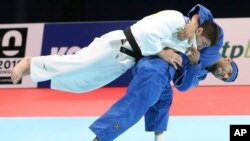A judo world champion from Iran could seek asylum in Germany after disobeying orders from the government to withdraw from the world championships in Tokyo to avoid a potential bout against an Israeli opponent.
The International Judo Federation said late Sunday that Saeid Mollaei was ordered to withdraw from last week's competition by Iranian deputy sports minister Davar Zani. The IJF said Mollaei was then called by Iranian Olympic Committee president Reza Salehi Amiri, who said security services were at his parents' house.
Mollaei was the defending champion and could have faced Israeli athlete Sagi Muki in the final. They were the two top-ranked athletes in their class prior to the world championships. Mollaei said he was ordered to withdraw ahead of a preliminary bout against a Russian so it didn't appear to be a boycott of Israel.
Mollaei kept competing but eventually lost in the semifinals and did not have to face Muki, who won gold and later called Mollaei "an inspiration."
"I want to compete wherever I can," Mollaei said in a statement from the IJF. ``I live in a country whose law does not permit me to. We have no choice, all athletes must comply with it. All I did today was for my life, for a new life.
"I need help. Even if the authorities of my country told me that I can go back without any problems, I am afraid."
IJF president Marius Vizer wrote on Twitter that Mollaei was in Germany and was "following the respective procedures" regarding asylum.
"Soon the procedure against Iran Judo Federation will start," Vizer said.
The IJF said it would help Mollaei prepare for next year's Olympics, also in Tokyo. If Iran refuses to enter him, one option could be the International Olympic Committee-backed team of refugee athletes.
"After learning about the case, the IOC has requested a full report from IJF. Based on this report we will further evaluate the situation," the IOC said.
The IOC, however, didn't comment when asked if it could invite Mollaei as a refugee, or whether it could take action against the Iranian Olympic Committee.
Iranian sports teams have for several decades had a policy of not competing against Israelis, which the country does not recognize. The IJF has said Iranians have thrown matches and used "questionable injuries" to avoid competing against Israelis.
Mollaei's case comes four months after judo officials hailed a breakthrough in relations with Iran, publishing a letter signed by Salehi Amiri pledging to "fully respect the Olympic charter and its non-discrimination principle."
On Saturday, Iranian Sports Minister Masoud Soltanifar accused the IJF of trying to "create problems" with Mollaei, the IRNA news agency reported. He said Iran will send a protest letter to the IOC.
Iranian team manager Majid Zareian also criticized the IJF, saying "everything was set in advance to put Mollaei against a participant from [Israel]."
"They did not allow me to be present next to my athlete in exercise salon," Zareian said. "After the competitions they changed hotel of Mollaei without my permission, against the regulations."
He denied reports Iranian authorities had put pressure on Mollaei.




